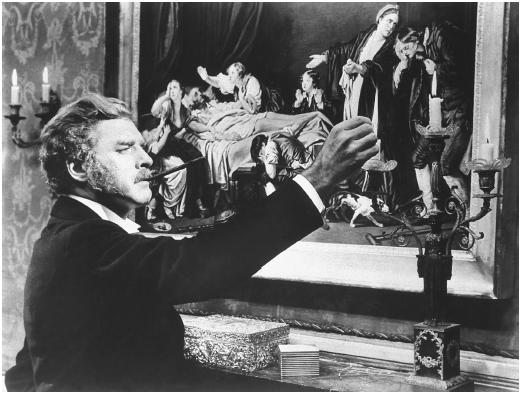2008 (1762)
2009 (1498)
2010 (796)
2011 (759)
2012 (633)
2013 (449)
2014 (575)
2015 (323)
2016 (276)
2017 (470)
2018 (127)
2023 (1)



Documentary on Luchino Visconti (01/12)
Luchino Visconti 是意大利導演。男, 生於1906年 11月2日 ,意大利米蘭,逝世於1976年3月17日 (意大利羅馬) , 父親是公爵,母親是大企業家的女兒,從小受貴族教育,青年時代熱愛戲劇。1936年在法國給導演雷諾阿當助理,自此開始從事電影工作。
導演的第一部故事片《沉淪》為意大利新現實主義鋪了路。1948年的《大地在波動》是新現實主義的代表作。他之後的作品如《戰國妖姬》、《白夜》、《洛可兄弟》、《魂斷威尼斯》等都是難得一見的佳作。1976年的《無辜》則是他最後遺作。
作品多以探索家庭崩潰為題材,尤其是貴族階層的窘迫貫穿多部作品。像許多歐洲的沒落貴族一樣,他一方麵信奉共產主義,另一方麵過著貴族般的奢華生活,並將這種矛盾滲透到文藝作品中。
(Mtime:http://www.mtime.com/person/895429)
In a short interview, Alain Delon talked about Luchino Visconti
Visconti directs Burt Lancaster
Count Luchino Visconti Di Modrone was born on 2 November 1906 in Milan, "as the curtain went up at La Scala", he said. He was born into an aristocratic family, one of the seven offspring of the Duke of Modrone and had a highly privileged upbringing. During his youth he mixed with luminaries such as conductor Toscanini, composer Puccini and the novelist Gabriele D'Annunzio. Not surprisingly, he had an early interest in music and theatre, but also a passion for horses. He bred race horses for eight years, thinking of little else. When this interest began to fade, he moved to Paris and befriended Coco Chanel. She introduced him to Jean Renoir with whom he worked briefly as assistant on Partie de campagne (1936), which turned his attention towards cinema. During this period, Visconti, previously a Fascist, switched to Communism.
Visconti briefly visited Hollywood before returning to Rome where he became part of the group associated with the journal Cinema. To fund his first film he sold some family jewels. Ossessione (1942), an unauthorised adaptation of James M. Cain's The Postman Always Rings Twice, had difficulties with the Fascist censors, but the result was an enormous success in Italy.
Visconti allowed his palazzo to be used as a secret headquarters for members of the Communist Resistance and he participated in armed action against the German occupiers. This led to him being imprisoned briefly by the Gestapo in 1944. His revenge came when he filmed the execution by firing squad of the head of the jail for the 1945 documentary Days of Glory. The Italian Communist Party commissioned him to produce a series of three films about fishermen, miners, and peasantry in Sicily but only La terra trema (1948) was made. This film, along with Rocco and His Brothers (1960), both portraying the plight of the working classes, were routinely censored by Italy's post war right-wing establishment.
From the 1960s, Visconti's films became more personal. Perhaps his greatest works are The Leopard (1963) and Death in Venice (1971). Visconti's lush adaptation of The Leopard, Giuseppe Tomasi di Lampedusa's 1958 novel, chronicles the decline of the Sicilian aristocracy during the Risorgimento, a subject close to his own family history.
Not the easiest of directors (leading lady Clara Calamai called him "a medieval lord with a whip"), Visconti nonetheless commanded the greatest respect from his actors. Despite his famed ill treatment of Burt Lancaster on the set of The Leopard, the actor still felt that Visconti was "the best director I've ever worked with... an actor's dream".
Luchino Visconti staged several plays including works by Jean Cocteau and Tennessee Williams. He was famed as an opera director as much as for his film-making, most significantly his work with Maria Callas who credited Visconti with teaching her how to act.
Openly bisexual, as was his father, Visconti's films have few explicitly gay characters, although there is often an undercurrent of homoeroticism. He favoured attractive leading men, such as Alain Delon, and his final obsession was Austrian actor Helmut Berger whom he directed in The Damned (1969), Ludwig (1972) and Conversation Piece (1974).
His smoking (up to 120 cigarettes a day) led to a stroke and subsequent ill health, but he rallied long enough to make The Innocent before dying in Rome in 1976. Luchino Visconti's funeral was attended by President Giovanni Leone and Burt Lancaster.
Some ridiculed Visconti's lifestyle, opulent by any standards, let alone a famed Marxist. Salvador Dali sneered "He was a Communist who only liked luxury". Visconti told an American reporter in 1961, "I believe in life, that is the central point... I believe in organised society. I think it has a chance".



